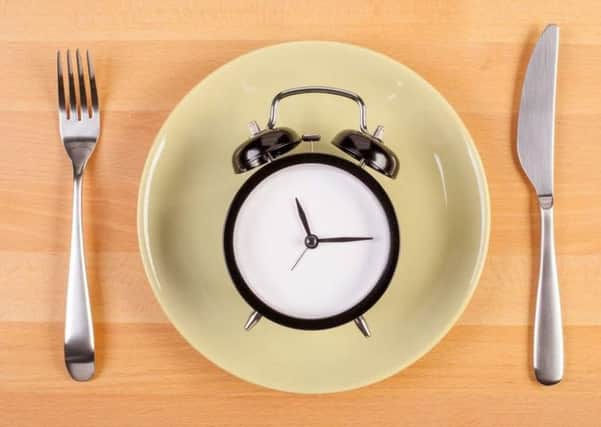Fasting diet can '˜turn back the ageing clock'


The study shows that the specially formulated diet, sold under the brand name ProLon, causes cellular changes normally generated by several days of just drinking water.
It also reduced cancer and inflammation diseases and extended lifespan in lab mice, the study found.
Advertisement
Hide AdAdvertisement
Hide AdBut it is safer than the 5:2 diet known as intermittent fasting when you eat normally five days and then drink just water for the other two days.
Scientists at the Longevity Institute at the University of Southern California found in human trials the diet targeted the ageing process and reduced risk factors for age related diseases such as diabetes, cancer, and cardiovascular disease.
They believe these effects are caused by an increase in stem cell number and regeneration.
ProLon is low in calories, sugars, and protein, high in good fats, gluten and dairy-free sold as 100 per cent vegetable‐based soups, energy bars, energy drinks, teas, and supplements.
The Fasting Mimicking Diet (FMD) provides the body with the necessary macro and micronutrients while keeping it in a fasting mode and activates stem cell-based regeneration in multiple organs and systems.
The scientists said intermittent fasting may have some beneficial effects but it carries many risks including hypoglycemia, hypotension, and/or gallstones.
Professor Dr Valter Longo said: “Calorie restriction or changes in dietary composition can enhance healthy ageing, but the inability of most subjects to adhere to chronic and extreme diets, as well as potential adverse effects limit their application.
“Despite its potential for disease prevention and treatment, prolonged fasting is difficult to implement in human subjects and may exacerbate pre-existing nutritional deficiencies, making it not feasible and/or safe for children, the elderly, frail individuals and even the majority of healthy adults.
Advertisement
Hide AdAdvertisement
Hide Ad“We have investigated whether a dietary intervention more practical and safe than fasting could affect markers or risk factors for ageing and diseases.”
The study, published in the journal Science Translational Medicine, involved a clinical trial with 100 volunteers who used ProLon for three monthly cycles.
It tested metabolic markers and risk factors associated with ageing and age‐related diseases.
Each ProLon cycle lasted five consecutive days and does not require alteration to lifestyle during the remaining days of the month.
Findings in humans were consistent with mouse studies showing a spike in circulating stem cells and delay in biological ageing by promoting regeneration in multiple systems.
It reduced body weight, BMI, total body fat, trunk fat, waist circumference, systolic and diastolic blood pressure, cholesterol, insulin‐like growth factor 1 (IGF‐1), and a marker of inflammation C-Reactive Protein, particularly in participants at risk for diseases.
It also increased relative lean body mass (muscle and bone mass)
Low levels of IGF-1 are associated with a lower risk of cancer and diabetes and no adverse effects were reported.
The effects were still noticeable three months afterwards.
Advertisement
Hide AdAdvertisement
Hide AdProg Longo said: “Cycles of a five day FMD is safe, feasible and effective in reducing risk factors for ageing and age-related diseases.”
The university has licensed the FMD nutri-technology to a Los Angeles-based firm to make ProLon - short for Promote health and Longevity
It enables consumers to benefit from the positive effects of fasting while allowing them to consume food.
It’s five-day “fasting with food” programme features meals ranging from 770 to 1,100 calories per day has been shown to promote effects on a wide range of markers that contribute to ageing, such as cholesterol, triglyceride, blood pressure, inflammation, IGF-1, and fasting blood glucose.
It also helped people lose an average of five pounds of fat and 1.2 inches of waist circumference, while preserving lean body mass (muscle and bone).